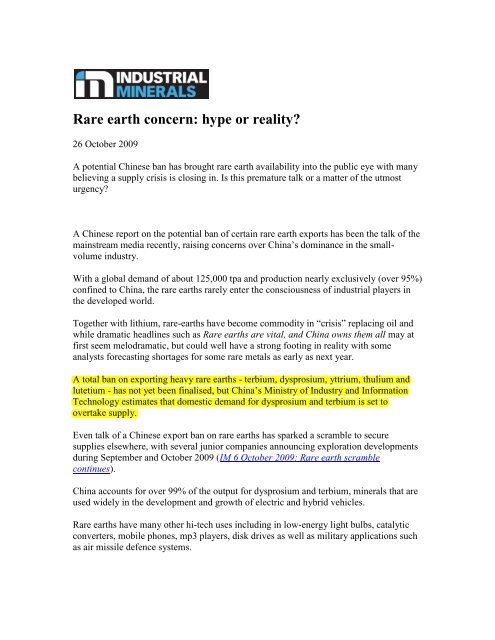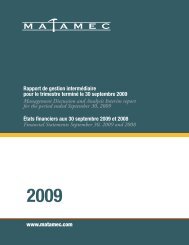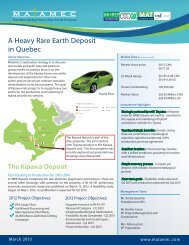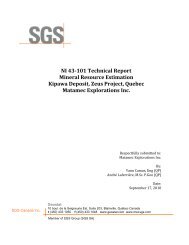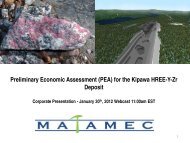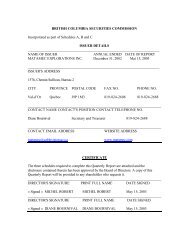Rare earth concern: hype or reality? - Matamec Explorations, Inc.
Rare earth concern: hype or reality? - Matamec Explorations, Inc.
Rare earth concern: hype or reality? - Matamec Explorations, Inc.
Create successful ePaper yourself
Turn your PDF publications into a flip-book with our unique Google optimized e-Paper software.
<strong>Rare</strong> <strong>earth</strong> <strong>concern</strong>: <strong>hype</strong> <strong>or</strong> <strong>reality</strong>?26 October 2009A potential Chinese ban has brought rare <strong>earth</strong> availability into the public eye with manybelieving a supply crisis is closing in. Is this premature talk <strong>or</strong> a matter of the utmosturgency?A Chinese rep<strong>or</strong>t on the potential ban of certain rare <strong>earth</strong> exp<strong>or</strong>ts has been the talk of themainstream media recently, raising <strong>concern</strong>s over China’s dominance in the smallvolumeindustry.With a global demand of about 125,000 tpa and production nearly exclusively (over 95%)confined to China, the rare <strong>earth</strong>s rarely enter the consciousness of industrial players inthe developed w<strong>or</strong>ld.Together with lithium, rare-<strong>earth</strong>s have become commodity in “crisis” replacing oil andwhile dramatic headlines such as <strong>Rare</strong> <strong>earth</strong>s are vital, and China owns them all may atfirst seem melodramatic, but could well have a strong footing in <strong>reality</strong> with someanalysts f<strong>or</strong>ecasting sh<strong>or</strong>tages f<strong>or</strong> some rare metals as early as next year.A total ban on exp<strong>or</strong>ting heavy rare <strong>earth</strong>s - terbium, dysprosium, yttrium, thulium andlutetium - has not yet been finalised, but China’s Ministry of Industry and Inf<strong>or</strong>mationTechnology estimates that domestic demand f<strong>or</strong> dysprosium and terbium is set toovertake supply.Even talk of a Chinese exp<strong>or</strong>t ban on rare <strong>earth</strong>s has sparked a scramble to securesupplies elsewhere, with several juni<strong>or</strong> companies announcing expl<strong>or</strong>ation developmentsduring September and October 2009 (IM 6 October 2009: <strong>Rare</strong> <strong>earth</strong> scramblecontinues).China accounts f<strong>or</strong> over 99% of the output f<strong>or</strong> dysprosium and terbium, minerals that areused widely in the development and growth of electric and hybrid vehicles.<strong>Rare</strong> <strong>earth</strong>s have many other hi-tech uses including in low-energy light bulbs, catalyticconverters, mobile phones, mp3 players, disk drives as well as military applications suchas air missile defence systems.
Many producers outside China were f<strong>or</strong>ced out of the market in the early 1990s as theAsian economy undercut prices, and it now produces over 95% of the global total.Chinese exp<strong>or</strong>t quotas have decreased each year f<strong>or</strong> the last eight years and, m<strong>or</strong>erecently, the government reduced exp<strong>or</strong>t quotas f<strong>or</strong> the first half of 2009 by around 34%from same period last year.Irreplaceable neodymiumThe Chinese government sees exp<strong>or</strong>t restrictions as a way of attracting technologycompanies to manufacture value-added products in China.As well as a heavy rare <strong>earth</strong>s ban, China is also considering restricting exp<strong>or</strong>ts of lightrare <strong>earth</strong>s such as neodymium, europium, cerium and lanthanum.“If the supply of rare <strong>earth</strong>s such as neodymium is restricted this could impact the supplyof magnets used in hard disk drive actuat<strong>or</strong>s,” said John Coughlin of US consultancy,Coughlin Associates.“At the very least these magnets might be available only to hard disk drives produced inChina. This could f<strong>or</strong>ce even m<strong>or</strong>e movement of hard disk drive production to Chinafrom other Asian countries,” he added.No replacement has been found f<strong>or</strong> the light rare <strong>earth</strong>, neodymium, a material used toenhance the power of magnets at high heat, which is also used in wind turbines andelectric mot<strong>or</strong>s.One US-based producer of rare <strong>earth</strong> minerals told IM: “If the entire policy is read, it isvery similar to documents released in 1999 by the PRC government.”“Their main idea is still to get manufacturers to move to China and make the entirefinished good containing rare <strong>earth</strong> that is ready f<strong>or</strong> sale to the market versus exp<strong>or</strong>tingrare <strong>earth</strong> oxides,” said the source.So, if China is not holding the w<strong>or</strong>ld to ransom with its exp<strong>or</strong>t policies as some rep<strong>or</strong>tssuggest, any tightening of supply is likely to see a step-up in non-Chinese rare <strong>earth</strong>sexpl<strong>or</strong>ation.<strong>Rare</strong> <strong>earth</strong> applicationsElectronics: MP3 players, flat screen monit<strong>or</strong>s, mobile phones, digital cameras, harddisk drivesAutomotive: Auto batteries, catalytic convert<strong>or</strong>s, diesel additives, magnetsEnvironmental: energy saving light bulbs
PolishingPhosph<strong>or</strong>s: giving colour to mobile phone and computer screens; used in eco-lightingGlobal rare <strong>earth</strong> production*Malaysia, Brazil


